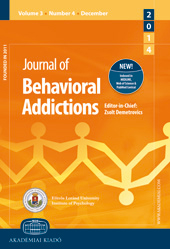Commentary on: Are we overpathologizing everyday life? A tenable blueprint for behavioral addiction research. Addictions as a psychosocial and cultural construction
Commentary on: Are we overpathologizing everyday life? A tenable blueprint for behavioral addiction research. Addictions as a psychosocial and cultural construction
Author(s): Martial van der LindenSubject(s): Social psychology and group interaction, Cognitive Psychology, Behaviorism, Substance abuse and addiction, Health and medicine and law, Sociology of Culture
Published by: Akadémiai Kiadó
Keywords: behavioral addictions; addictive behaviors; addiction-as-disease approach; psychosocial and cultural approaches; individualized psychosocial formulation;
Summary/Abstract: This commentary proposes a complementary perspective to that developed by Billieux, Schimmenti, Khazaal, Maurage and Heeren (2015). The addiction-as-disease approach tends to sideline explanatory factors of a psychosocial, cultural, political, or historical nature. I therefore suggest taking into account not only the personal characteristics (loss of self-control, impulsivity) related to the disease model, but also the social determinants of addictive behaviors (weak social ties, social exclusion, hyperindividualism, poverty, unemployment, etc.). Moreover, the disease model of addiction removes addictive behaviors from the cultural and historical contexts that shape them. I argue that the cultural and historical reasons for which certain factors (such as loss of self-control) became so important in the explanation of addictive behaviors should be more thoroughly considered.
Journal: Journal of Behavioral Addictions
- Issue Year: 4/2015
- Issue No: 3
- Page Range: 145-147
- Page Count: 3
- Language: English

